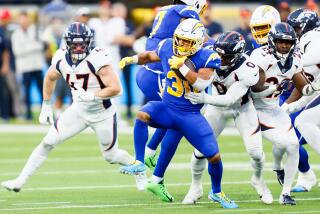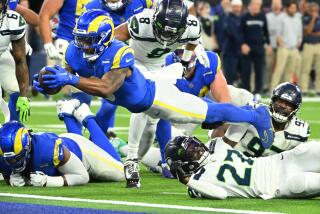No Dunce Cap for the 49ers : NFL: It’s a salary cap, and Policy has made it fit with creativity that infuriates doomsaying rivals.
- Share via
SAN FRANCISCO — Repeat after me: The San Francisco 49ers are not going out of business.
Never has one team soared so high amid rumors it is about to plunge so low. The Dallas Cowboys once went to the Super Bowl with the Doomsday Defense. San Francisco is going with doomsday predictions.
Yes, the 49ers did load their roster with big stars and did load their stars with incentive and signing bonuses deferred into the future. But there is life after the Super Bowl. Carmen Policy, San Francisco ‘s team president, has beaten the cap and lived to tell about it by using creative financing.
“I’m comfortable with both the present and the future of the San Francisco 49ers,” Policy said.
The speculation began after the 49ers, already rich in offensive talent with such players as Steve Young, Jerry Rice and Ricky Watters, added center Bart Oates and a veritable all-star team of defensive players--Ken Norton Jr., Rickey Jackson, Gary Plummer, Richard Dent and, finally, the keystone, Deion Sanders.
Critics from all over the league lined up to wag their fingers and prophesy disaster.
“This is a farce,” owner Tom Benson of the New Orleans Saints said after losing the bidding war for Sanders.
Others chimed in with dire projections:
--The 49ers have mortgaged their future with a credit-card mentality.
--The 49ers have piled so many incentive and signing bonuses on their 1995 salary-cap figure that they will be lucky to sign an equipment manager.
--The 49ers better win it this year because you won’t hear from them again until the turn of the century.
Professional jealousy?
Policy winces at those two words.
“I don’t know that I want to call it professional jealousy,” he said. “I might call it professional frustration.”
Call it what you will, Policy has the numbers to back up his spending policy. The 49ers did use their impressive mercenaries to make it to Super Bowl XXIX. But what proved to be a farce was not the signing of Sanders and the other newcomers in 1994, but rather the idea that all teams were going to be created equal under the new system.
Policy was an attorney in Youngstown, Ohio, representing a client suing the DeBartolo Corp., and struck up a friendship with Eddie DeBartolo Jr., who would eventually buy the 49ers. By 1991, Policy was team president.
The man who had never seen a pro football game before meeting DeBartolo might have revolutionized the NFL.
In November 1993, with the salary cap on the horizon, Policy front-loaded the contracts of 17 players, taking future earnings and putting them in 1993 where they wouldn’t be affected by the cap.
Voila! A $46-million 1993 payroll became $56 million. But, for purposes of the cap, San Francisco had gained much-needed breathing room.
The 49ers weren’t exactly sitting on a surplus, though. By the spring of ‘94, they were down to $432 with 19 unsigned players. But Policy trimmed and cut and restructured. To get Sanders, he persuaded players to agree to rewritten contracts, turning some of their money into deferred bonuses.
That’s when the speculation began that the 49ers had bought themselves trouble down the road. Here are the facts:
--Should heavily favored San Francisco beat the San Diego Chargers in the Super Bowl, the two major incentive bonuses facing Policy will be Jackson’s and Sanders’. Jackson has already earned his, $838,000, because he played in the required number of games and because San Francisco won the NFC championship. Sanders has earned $500,000 of his because the 49ers are in the Super Bowl and will get $250,000 more if they win it.
If the salary cap were to remain at its present level of $34.6 million, San Francisco would be nearly $1.6 million over the allowable limit. Policy is figuring that the cap, based on a percentage of revenue, will go up in 1995, absorbing most, if not all, of that.
If that is not the case, there is still room to maneuver, even though the 49ers must pay out $4.876 million in signing bonuses next season, $4.16 million in 1996 and on into 1999, the amount diminishing each season.
Variables can be found all over the place. San Francisco might lose Sanders, who figures to become an unrestricted free agent, as do Jackson and two reserves, cornerback Toi Cook and running back Dexter Carter. The 49ers also might lose as many as three players in the expansion draft.
They have the right of first refusal on Watters, but must wait to see what kind of offer the running back gets. They could slash Dent’s $1.95-million salary, or cut him altogether. He has barely played this season. They have guard Ralph Tamm, at $700,000, and linebacker Todd Kelly, at $625,200, who are expendable.
Sanders is not expendable, but the 49ers might have no choice. The star cornerback has a $5-million option in his contract, but team officials concede they won’t be able to make the required payment by March 1, the deadline for retaining him. That means he will go back into the free-agent market, leaving the 49ers again bidding against everybody else in the NFL for his services.
And that’s assuming that baseball’s labor dispute hasn’t been settled. If it is, the 49ers may have even more competition for Sanders, who plays baseball for the Cincinnati Reds and is being pressured to sign a baseball-only contract.
Sanders says he doesn’t want to address his future until he deals with the present. He’s more concerned with what Charger quarterback Stan Humphries will do on Jan. 29 than with what Policy will do in the off-season.
But Policy found a way to land the defensive star once. Don’t bet against him a second time.
Jackson says he might not even be a factor. The linebacker spent 13 years with the Saints and played well enough to be named to the Pro Bowl six times. Now he’s making the ultimate trip for a pro football player, to the Super Bowl, and he’s thinking that might be a nice way to say goodby.
“I don’t want to worry about what’s going to happen, but I may not play next year,” he said. “It is not an issue. My one issue is going to the Super Bowl.”
It really doesn’t serve any purpose to speculate about the facts and figures that will determine the makeup of the 1995 49ers, elements that won’t be known for perhaps months.
The point is, they remain as competitive in the front office as they do on the field.
Policy wasn’t always so sure this would all work out.
“I didn’t know how I’d be accepted, a lawyer from Youngstown, Ohio, who didn’t know whether a football is blown up or stuffed,” he recalled of his entry into the NFL.
No matter. He has shown he knows how to stuff a lot of stars onto a roster, despite the tight squeeze caused by the salary cap.
Somebody else can worry about the footballs.
More to Read
Go beyond the scoreboard
Get the latest on L.A.'s teams in the daily Sports Report newsletter.
You may occasionally receive promotional content from the Los Angeles Times.










